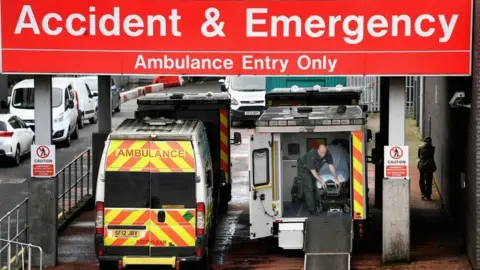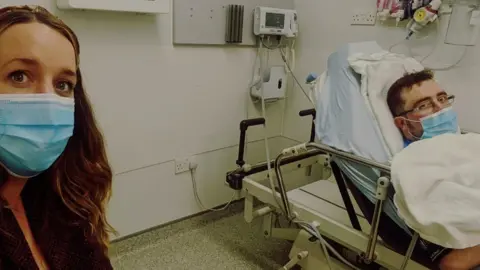Scots NHS doctors: Rise in patients waiting 24 hours in A&E 'shocking'
 Getty Images
Getty ImagesThe number of people in Scotland who waited 24 hours or more in A&E in the first half of this year was more than 250 times higher than in 2019.
Figures obtained by the Royal College of Emergency Medicine said that 3,949 patients spent a day or more in A&E in the six months up to June this year.
That compared with 15 patients during the same period in 2019.
Doctors described the rise as shocking. The government said "A&E performance is not where it needs to be".
The figures were obtained by Royal College of Emergency Medicine (RCEM) through a Freedom of Information request to Public Health Scotland.
They showed that it was highly unusual for patients to spend very long periods in A&E before 2020.
Between 2013 and 2018, there were only a handful of patients each year who had to wait 24 hours or more.
But the numbers began to increase dramatically later in 2021, and then in 2022 almost 7,000 patients waited at least 24 hours to be admitted, transferred or discharged.
The figure stood at 3,949 for the first six months of this year - with the winter months still to come.
Doctors described the figures as "completely unacceptable" and warned that delays were associated with patient harm and increased mortality.
Additional funding
"Every day we see appalling numbers of people facing long waits for care," said Dr John-Paul Loughrey, the vice president of the RCEM.
"What is shocking is the speed and scale of the increase in these waits in just a few years," he told BBC Scotland News, adding that the waits are particularly distressing for vulnerable elderly patients and those facing a mental health crisis.
"The government cannot ignore the fact that 24 hours in A&E has become reality and emergency care is not functioning as it should."
He said there were no plans to increase the number of beds in hospitals and no measures to retain staff, who were facing burnout and exhaustion.
Dr Loughrey added: "24 hours in A&E belongs on TV, not in daily reality for patients and staff."
Earlier this year, the RCEM estimated that there were at least 300 to 500 excess deaths across the UK linked with crowding and long wait times in emergency departments.
Scotland's Health Secretary Michael Matheson warned that the country faced "extremely challenging" months ahead when he announced the Scottish government's winter resilience plan for the NHS.
'Significant investment'
The minister pledged an additional £50m in funding for the Scottish Ambulance Service to help deal with increased demand, as well as plans to extend Hospital at Home care.
However, doctors have since criticised the plan as "disappointing" and urged the government to take "meaningful action to avoid a repeat of last winter".
Data from the National Records of Scotland, released last week, revealed that Scotland's winter death toll last year was the highest for more than 30 years.
Health Secretary Michael Matheson said: "I am clear that A&E performance is not where it needs to be and we are working closely with boards on measures to help reduce the number of long delays - which remain too high.
"Our Winter Plan will support boards to maximise capacity to meet demand and our £12m expansion of Hospital at Home will ensure people receive care at home or as close to home as possible, where clinically appropriate, to help reduce pressure on our emergency departments."
He added: "As a result our significant investment of over £15m, an additional 1,000 nurses, midwives and Allied Health Professional from overseas have joined NHS Scotland in the last two years to bolster our existing workforce this winter
"Our £50m funding for the Scottish Ambulance Service will help tackle increased demand and support on-going recruitment - this investment will help reduce the need for people to go to hospital."
'Every time I was in A&E, I was terrified Matt was going to die'

Hayley Smith, whose husband Matt died in 2021 at the age of 33 from a brain tumour, described every A&E trip as "absolutely terrifying" due to long wait times.
Matt's form of cancer caused frequent seizures, and Hayley says they were "constantly" in A&E as a result.
They once waited 10 hours for an ambulance and then a further 13 "sat on a plastic chair" in the emergency department waiting to be seen. It was then another four hours before he was given a bed.
"I think every single time I was in A&E, I was just absolutely terrified that Matt was going to die," she said.
"The more time Matt waited, the more he was likely to die.
"With a brain tumour patient, if they don't get the drugs to reduce swelling or they don't get the scans to see what's going on, they could literally die."
Hayley believes that the long waits both lessened the time he was able to spend with loved ones, and resulted in longer stays in hospital than might have been necessary if he received treatment faster.
"We understood that Matt wasn't going to live as long as other people were, but what we were hoping was that we would have as much time with him as possible.
"Following most of Matt's A&E visits, he was in hospital for an extended period of time between seven and 10 days, and that was wherever they could squeeze him in a ward."
Overworked staff
She says that following one A&E visit, Matt was placed in a dementia ward for 10 days because there were no beds for him anywhere else.
Hayley says that it was "really difficult" to get the attention of staff because they were so overworked, and that spending time in the emergency department was traumatic in itself.
"Not only did I have the stress levels of making sure Matt was alright, but you were also seeing patients who were in pain, who were screaming, who were seeing family members distressed."
She added: "I think although we were sat in A&E, I very much felt like I was responsible for keeping Matt safe even though we were in a hospital, because we just weren't getting that immediate treatment.
"Probably some of my worst memories out of thinking back on Matt being ill have been when we were in A&E."
